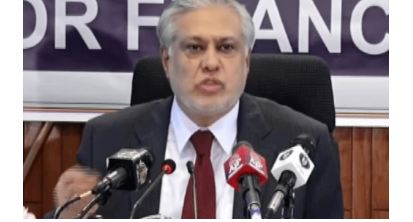ISLAMABAD, JUN 10: Finance Minister Ishaq Dar stated on Saturday that Pakistan had faced a “deep and steep” economic vulnerability, which it had successfully overcome, resulting in a halt to “any further decline”.
He made this assertion at a post-budget press conference in Islamabad a day after presenting the budget for the fiscal year 2023-24 with a total outlay of Rs14.46 trillion, including a projected GDP growth rate of 3.5 per cent.
At the outset of the presser, Dar expressed his intention to provide a comprehensive explanation of all aspects of the budget.
The minister stated that there is a customary practice of forming two committees within the FBR — one for business-related issues and the other for technical matters.
He said that the FBR chairman will obtain his approval on the matter, and the committees will be formed by Monday. “The purpose of these committees is to address any missed aspects and provide an opportunity for individuals with complaints or genuine recommendations to be heard and considered by the government.”
Dar described the budget as being different from traditional budgets, emphasising its focus on progress linked to economic growth.
He expressed the government’s aim to reverse all economic losses, adding “our first objective is to go back to achieve 2017 economic indicators.”
He insisted that the proper and transparent implementation of the PSDP would facilitate the attainment of a 3.5 per cent growth rate with ease.
The minister acknowledged the deep and steep vulnerability faced by the country, but stated that efforts had been made to prevent further decline.
He emphasised that it should be a national goal to steer Pakistan towards the path of development.
The minister shared the government’s aim to bring about an agricultural revolution, underlining that the country possessed significant untapped potential in this sector.
Dar highlighted that debt servicing constitutes one of the largest portions of the current year’s budget. He said efforts would be made to reduce this burden and reverse the prevailing trend.
Dar emphasised the importance of starting somewhere, stating that with economic growth, positive changes will follow.
He highlighted that employment opportunities would increase, leading to the correction of macroeconomic indicators, a reduction in inflation, and the creation of more jobs. Consequently, the policy interest rate would also decrease, he added.
“No new tax is being imposed this year, and the government has tried to provide as much relief as possible,” Finance Minister Ishaq Dar announced at the beginning of his budget speech.
Unveiling the budgetary measures, Dar announced the government’s proposal to increase the salaries of government employees by 30pc-35pc and a 17.5pc in the pensions of the retired persons.
There would be a raise of 35pc in the salaries of employees from grade 1-16 and 30 per cent to grade 17-22 employees aimed at increasing their purchase power.
Besides that, the government proposed to fix the minimum pension at Rs 12,000 and raised the minimum monthly wage from Rs 25,000 to Rs 32,000.
The government has budgeted total current expenditure at Rs13.3tr for FY24, which is 53pc higher than last year’s budgeted figure.
Of that, defence expenditure constitutes Rs1.8tr, 15.4pc higher than last year’s budget, making up 1.7pc of GDP.
The government has projected a fiscal deficit of Rs7.57tr (7.1pc of GDP) for the upcoming year, which is the highest in history, surpassing the Rs6.4tr recorded during the current fiscal year. This will be partially offset by an anticipated Rs650bn provincial cash surplus, bringing the consolidated deficit to Rs6.9tr or 6.5pc of GDP.
Interest payments, or debt servicing, budgeted for FY24 have risen a whopping 85pc from last year to Rs7,303bn — accounting for 55pc of total current expenditure — making it the single largest expenditure of the government.
The tax collection target for the Federal Board of Revenue (FBR) has been set at Rs9.2tr, which is 23pc higher than last year’s target.
Following last year’s actual high inflation at 28.2pc, the government set a target of 21pc for the next fiscal year.
Even though the finance minister insisted that all conditions of the IMF had been met and that a staff-level agreement over the 9th review can be signed at the earliest, the budget documents indicated no inflows from the IMF for the remainder of this year.
The external borrowing projections for the next fiscal are 114pc higher than the actual Rs3.2tr of inflows recorded this year. The government expects a total of $5bn in inflows from Saudi Arabia, including $3bn in time deposits and $2bn fresh deposit, compared to about $2bn received this year.

















